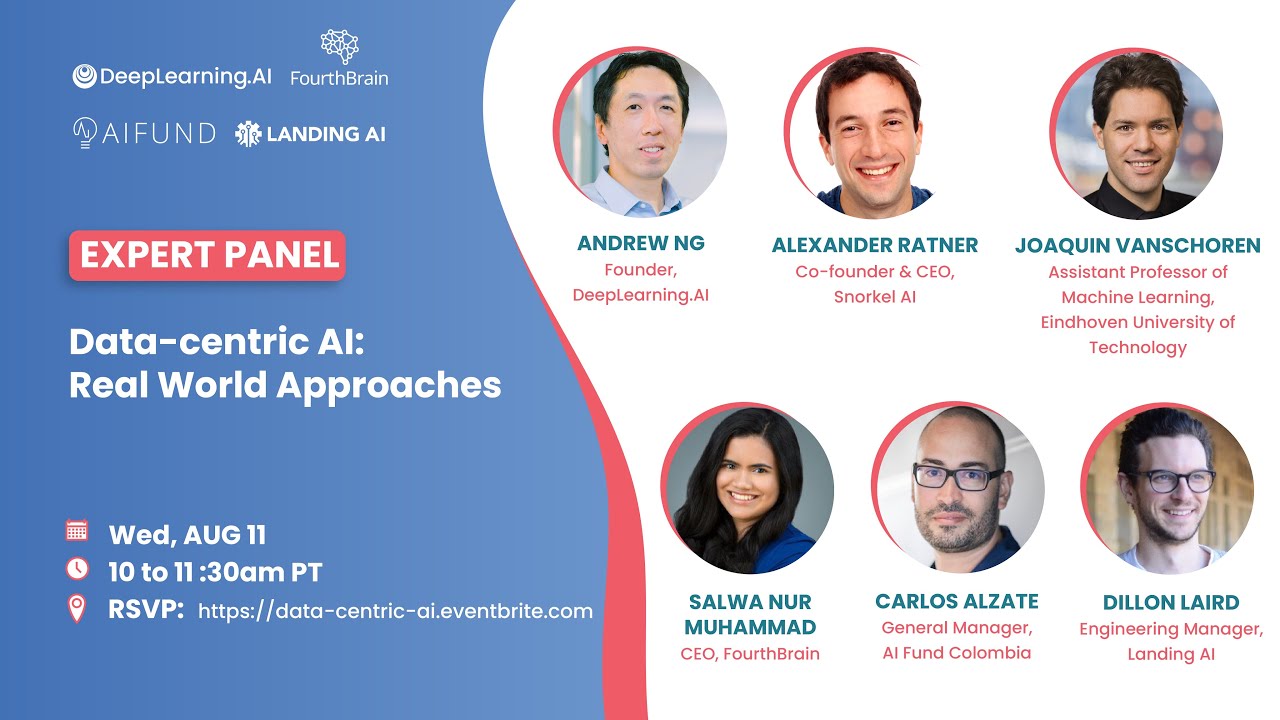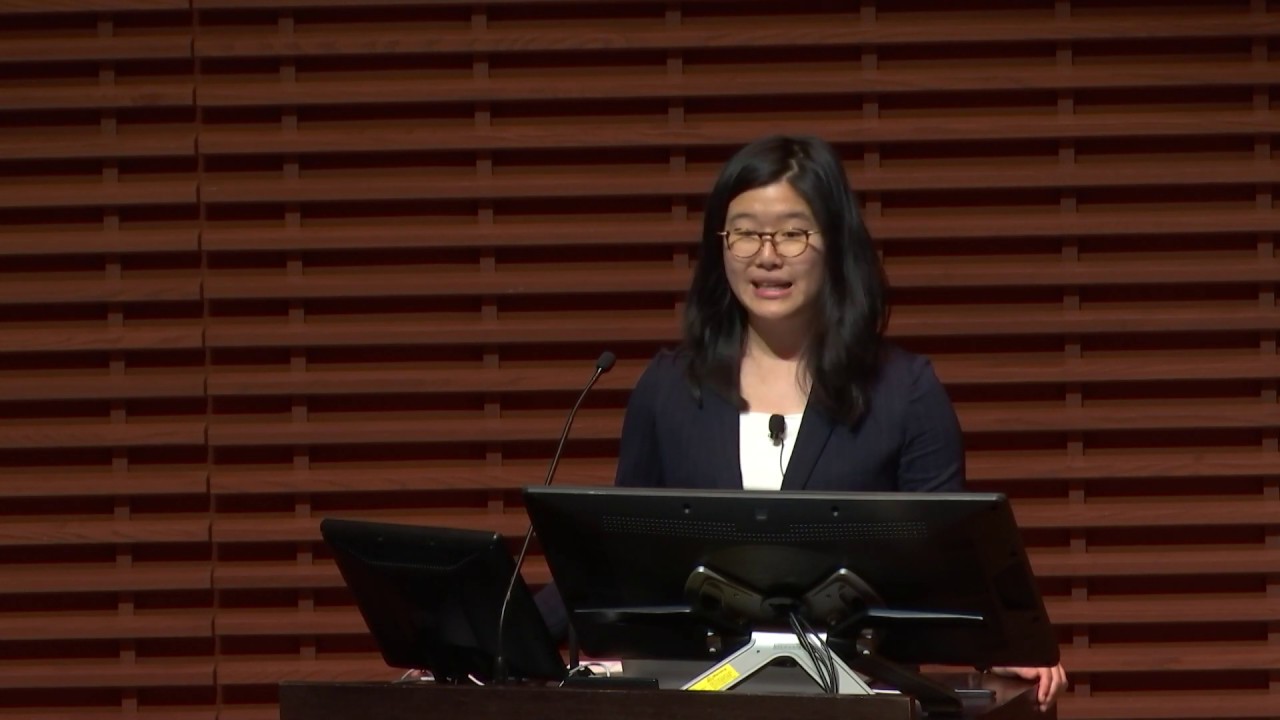DeepLearningAI
How to participate in Q&A:
Join our community on Discourse to post questions to our speakers and discuss with others on Data-centric AI.
– If you are new to our Discourse community, click here https://bit.ly/discourse-data-centric-ai
– If you have already created an account on our Discourse community, go to https://community.deeplearning.ai/c/random-discussions/data-centric-ai/67 (You can also find the Data-centric AI subcategory page under General Discussions on the home page.)
– You can ask a question by creating a topic, and you can also upvote others’.
Event agenda (*subject to change):
10-min: Keynote speech: Andrew Ng
15-min: Presentations from the panel speakers on their work and the real world approaches of data-centric AI
45-min Panel discussion:
20-min Q&A
In this event, Dr. Andrew Ng and his teams, as well as other industry leaders will be sharing their views as well as real-world use cases on how they have elevated data-centric approaches to improving the performance of machine learning models.
This event is a special collaboration between DeepLearning.AI, FourthBrain, Landing AI and AI Fund (all founded by Dr. Andrew Ng and/or backed by the AI Fund).
To learn more:
Data-centric AI competition (submission deadline: Sep 4, 2021): https://https-deeplearning-ai.github.io/data-centric-comp/
Andrew Ng’s speech on MLOps: From model-centric to data-centric AI: https://youtu.be/06-AZXmwHjo
DeepLearning.AI: https://www.deeplearning.ai/
FourthBrain: https://www.fourthbrain.ai/
Landing AI: https://landing.ai/
AI Fund: https://aifund.ai/
Source




8:09 – 24:25 Andrew Ng: The Data-centric AI Movement
25:21 – 30:31Alex Ratner, Co-Founder & CEO Snorkel AI: Programmatic Supervision for Data-Centric AI
31:02 – 36:07 Joaquin Vanschoren, Assistant Professor of Machine Learning Eindhoven University of Technology: NeurIPS Datasets and Benchmarks Track and OpenML.
37:21 – 43:27Salwa Nur Muhammad, CEO FourthBrain: Learning MLOps with a Data-centric approach
44:06 – 56:38: Carlos Alzate, General Manager AI Fund Colombia: A data-centric approach to zero-shot learning in NLP applications
57:01 – 1:01:44 Dillon Laird, Engineering Manager Landing AI: LandingLens as a Data-Centric AI platform
Q&A
1:09:24 What would Data-Centric AI look like for applications with structured data?
1:15:45 Data-Centric AI approaches to reinforcement learning
1:21:35 Tossing out bad examples: Real world production data distribution
1:27:00 Data Centric Application for NLP
Great presentations! Thank you a lot!
Amazing and wonderful discussion
Thanks especially to professor Ng for his clear introduction!
Amazing traction on the new paradigm for AI development – (Data-centric Approach) and great presentations on the initiatives for creating better and quality data.
It's always interesting to listen to Professor NG, he's really a reference to guide us. I recommend his courses as a starting point on Coursera and many other courses. All of Laurence Moroney's courses are also very exciting
Dear Andrew thank you so much for such a great insight to data centric AI. I have a question, how far are we from a point where AI can be used to detect errors with more unsupervised than heavily supervised as we do it today. (For example in your pill example, you put so much focus on labelling. I think a human detection system works completely different than AI works today. we dont need to look at so much labelled defect data to detect damages in the pill. In fact, we can detect even looking at a defective pill for the first time.)
I agree we do supervised learning as well. But we learn in a more generalized approach about what is a scratch, what is a defect rather than what is scratch on a pill. A learning/knowledge that easily transfers from one domain to other. That is actually where scientists can focus. To understand the mechanism of AI learning process for generalizing knowledge from data instead of always focussing on the data for every unique application in a different way.
really awesome .
How do the panelists think about synthetic data?
The example at 19:04 with the 'bad examples'…..I can see it's certainly easier for the task of labelling to toss them out, but the reality is that using the AI in the field will throw up such examples. Are we not better to try and deal with them? After all the AI is going to give some answer one way or the other and if we ignore them in the training set, don't we leave the AI unequipped to deal with it?
Incredibly rich! Thanks for all the good ideas.
Can AI clean itself? in other words, can an AI algorithm reform the dataset in order to enhance its performance?
Thank you so much for this event! As an ML-beginner myself, I found this very enlightening and inspiring!
why does andrew sound like a robot? Anyways, andrew the goat.
The data-centric approach came through in the window slotting of the presenters during the Q&A part.
All presenters with headsets to the left; those without to the right 😀
Like one questioner, I am also concerned that the resulting model may be less robust to real life applications where you cannot control the input data. I guess a delicate balance is needed so as to throw out all seemingly ambiguous data.
Would unsupervised algorithms such as clustering be ideal for systematically labeling y? What pitfalls are there?
Love Andrew Sir, thank you sir